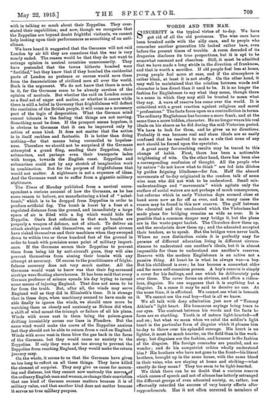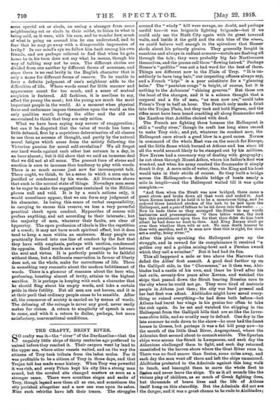WORDS AND .THE MAN.
SINCERITY is the typical virtue of to-day. We have got rid of all the old pretences. The wise ones have been brushed aside with the silly ones, and to people who remember another generation life looked rather bare, even before the present times of trouble. A room denuded of its draperies discloses its true proportions, but it is apt to be somewhat resonant and cheerless. Still, it must be admitted that we have made a long stride in the direction of frankness,
and that is worth a sacrifice. If old people feel less at home, young people feel more at ease, and if the atmosphere is rather bleak, at least it is not stuffy. On the other hand, it may well be maintained that the relation between words and character is lees direct than it used to be. It is no longer the fashion for Englishmen to say what they mean, though there is a sense in which they may still be trusted to mean what they say. A wave of reserve has come over the world. It is coincident with a great reaction against religious and moral professions." The facts force upon us a contradiction in terms. The ordinary Englishman has become a more frank, and at the same time a more bidden, character. He no longer wears his real ideals on his sleeve as he did during the mid-Victorian period. We have to look for them, and he gives us no directions. Probably it was because real and sham ideals are so easily confused that he resolved to make a rule that none of any sort should be forced upon the spectator.
A great many far-reaching results may be traced to this change of habit. First, there has been a noticeable brightening of wits. On the other hand, there has been also a corresponding confusion of thought. All the people who by nature "do not know what to think" are led into ditches by guides feigning blindness—for fun. Half the absurd movements of to-day originated in the random talk of some wise man who did not wish to be understood. Small mis- understandings and " movements " which agitate only the surface of social waters are not perhaps of much consequence, but reforms which in early Victorian days seemed close at hand seem now as far off as ever, and in many cases the reason may be found in this new reserve. The gulf between the educated and the uneducated which the Victorians had made plans for bridging remains as wide as ever. It is possible that a common danger may bridge it, but the plans are in the waste-paper basket, The Churches drew them up, and the secularists drew them up ; and the educated accepted their tenders, so to speak. But the bridges were never built. Where no race distinction exists it is perfectly easy for persons of different education living in different circum- stances to understand one another's ideals, but it is almost impossible for them to understand one another's reserves. Reserve with the modern Englishman is an active not a passive thing. At heart he is what he always was—a boy. But his childhood is over; he has become a somewhat older and far more self-conscious person. A boy's reserve is simply a cover for his feelings, and one which he deliberately puts over them. The cover forme an obvious, and often a ridicu- lous, disguise. No one supposes that it is anything but a disguise. In a sense it may be said to deceive no one. At the same time, it is effectual. We cannot see what is beneath it. We cannot see the real boy—that is all we know.
We all talk with deep admiration just now of "Tommy Atkins's" light heart. His humorous sayings bring tears to our eyes. The contrast between his words and the facts be faces are so startling. Youth is of nature light-hearted—off and on ; but what we mean when we extol the soldier's light heart is the particular form of disguise which it pleases him to-day to throw over his splendid courage. His heart is no lighter, it must be much heavier, on the field than in the work- shop; but disguises are the fashion, and humour is the fashion of the disguise. His foreign comrades are puzzled, and no wonder ; and do his compatriot critics wholly understand him P His brothers who have not gone to the front—his literal brothers, brought up in the same house, with the same blood in their veins, who are staying at home and striking—what exactly do they mean P They too seem to be light-hearted.
We think there can be no doubt that a curious reserve which comes of speech and not of silence has latterly estranged the different groups of even educated society, or, rather, has effectually retarded the success of very hearty efforts after rapprochemcds. Has it not often occurred to members of some special set or circle, on seeing a stranger from some neighbouring set or circle in their midst, to listen to what is being said, as it were, with his ears, and to wonder how much of what ie going on around him he can understand, and to fear that he may go away with a disagreeable impression of levity P In our mind's eye we follow him back among his own friends, and are perhaps relieved to find that when he gets Lome he in his turn does not say what he means, though his way of talking may not be ours. The different circles are divided from one another by different forms of nonsense, and since there is no real levity in the English character that is only a name for different forme of reserve. To be unable to form a definite judgment of one's neighbour adds to the difficulties of life. Where words count for little manner and appearance count for too much, and a sense of mutual suspicion is fostered. All fashions, it is needless to say, affect the young the most; but the young are much the most important people in the world. At a moment when physical force and endurance impose themselves upon the world as the only qualities worth having the older and the old are constrained to think that they are only critics.
What we have been Baying may savour of exaggeration ; bet can it be disputed that the value of words has been a little debased, first by a capricious determination of all classes to use them as screens of thought, and partly by the natural moral fatigue which arose from the satiety following the Victorian passion for moral self-revelation P We all forgot our hard words against each other last autumn in a day, in an hour almost; but it did show that we said an immense deal that we did not at all mean. The present time of stress and emotion is sure to increase that tendency to play with words. There is so much excuse just now for inconsequent talk. There ought, we think, to be a sense in which a man can be justified or condemned by his words. All literature shows that such is the normal state of things. Nowadays men seem to be eager to make the suggestions contained in the Biblical phrase null and void. It is by a man's actions only, it would sometimes appear, that we can form any judgment of his character. In losing this sense of verbal responsibility, in carrying to excess this reserve, we lose a very powerful practical check upon conduct. Hypocrites of course will profess anything, and act according to their interests ; but the majority of men, whatever their faults, are clear of hypocrisy. The open profession of ideals is like the repetition of a creed ; it may not have much spiritual effect, but it does tend to keep a man within an enclosure. Many people are practically forced into one line' of conduct by the fact that they have with emphasis, perhaps with unction, condemned rte opposite. Good words are a sort of marriage-tie between the soul and virtue. It is perfectly possible to be faithful without them, but a deliberate reservation in favour of liberty does not, on the whole, make for correctness of life. There is something very romantic about the modern belittlement of words. There is a glamour of romance about the hero who, professing, boasting almost of levity, attains to the highest sacrifice. It is perhaps in keeping with such a character that he should fling about his empty words, and take a certain pride in their futility. But all men are not heroes, and it is at their peril that ordinary people cease to be sensible. After all, the commerce of society is carried on by means of words. The debasing of the coinage is never any good, never really makes for riches. A return to simplicity of speech is sure to come, and with it a return to duller, perhaps, but more satisfactory, conversational conditions.



































 Previous page
Previous page